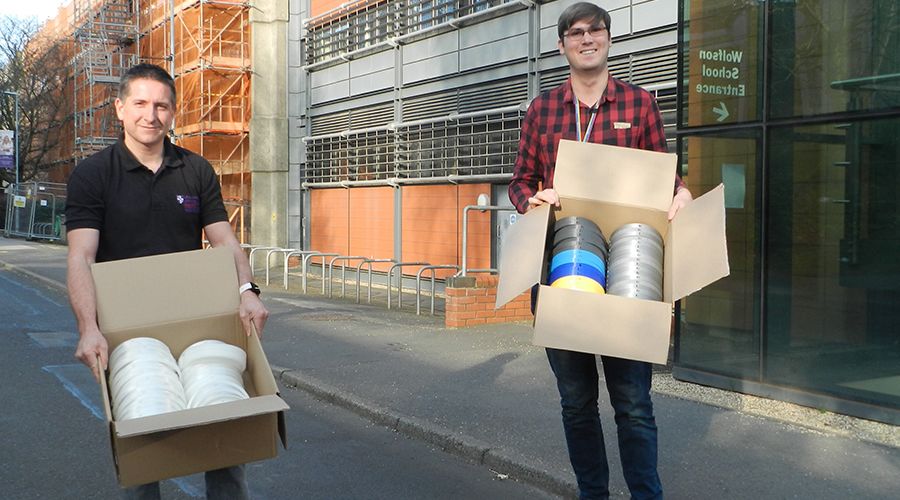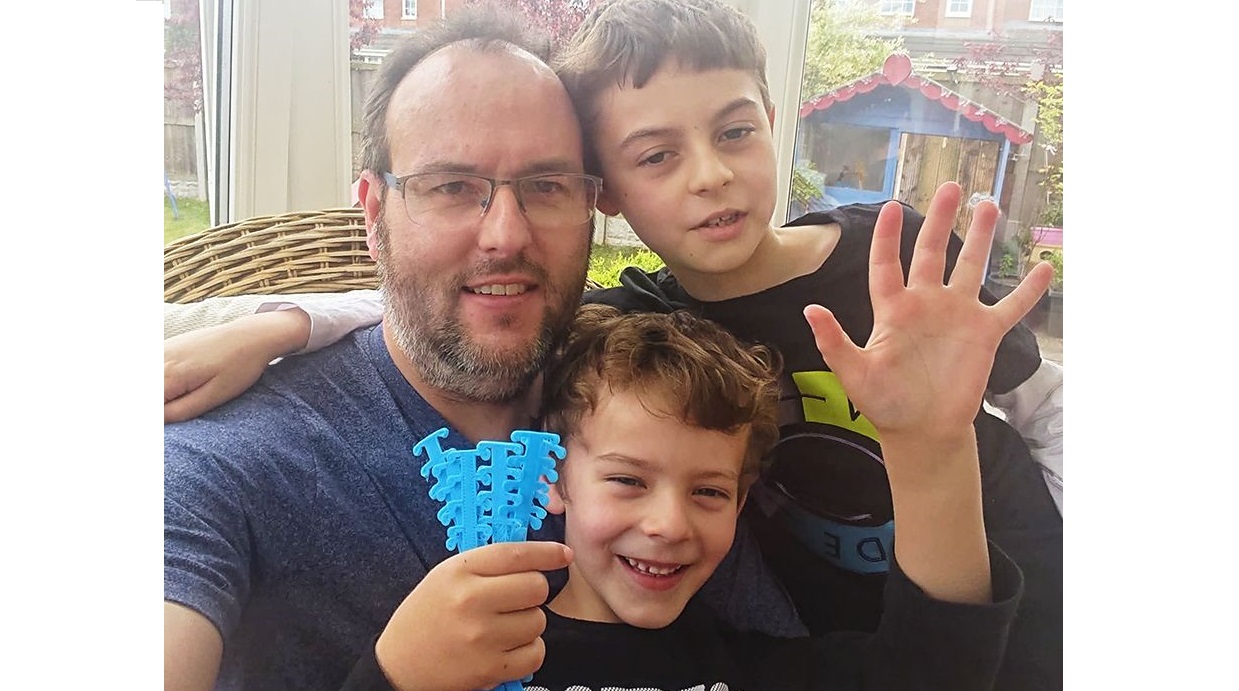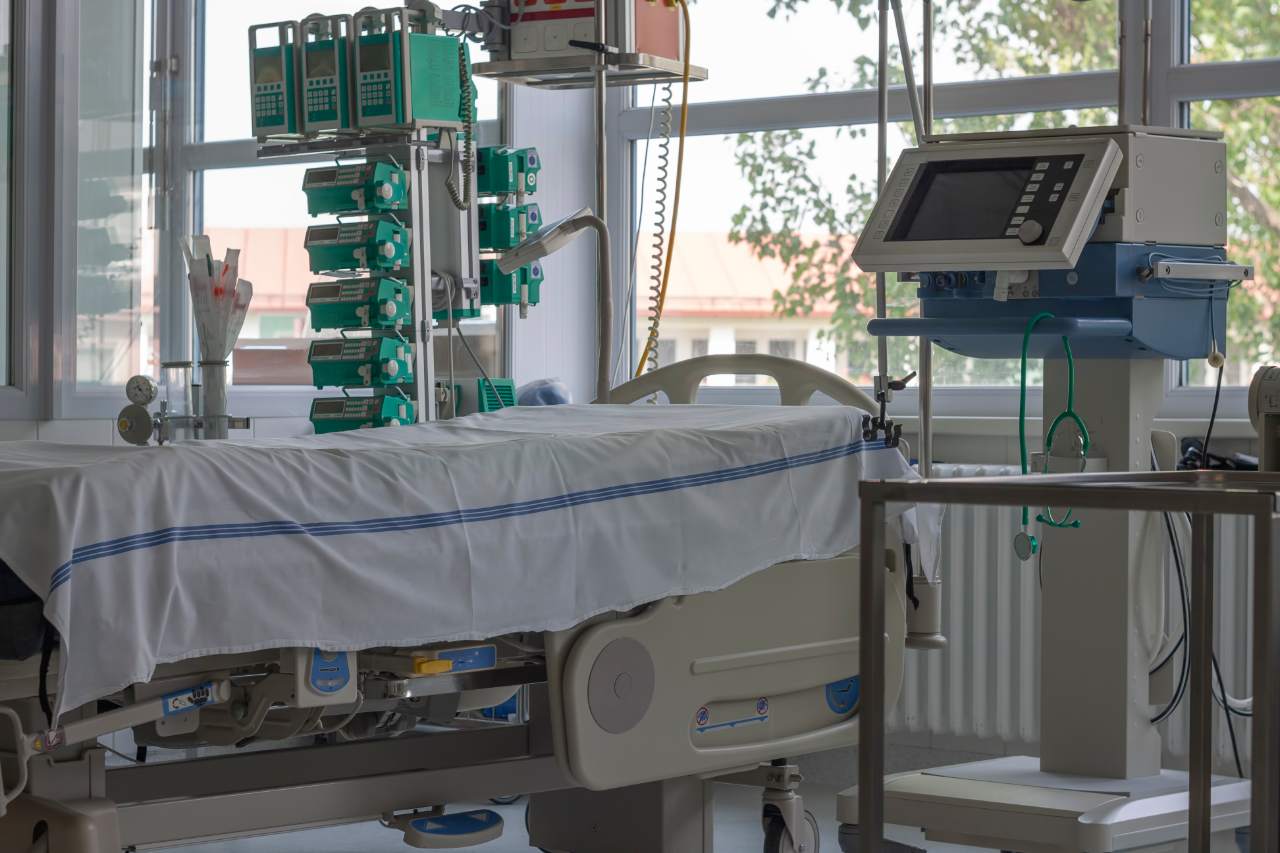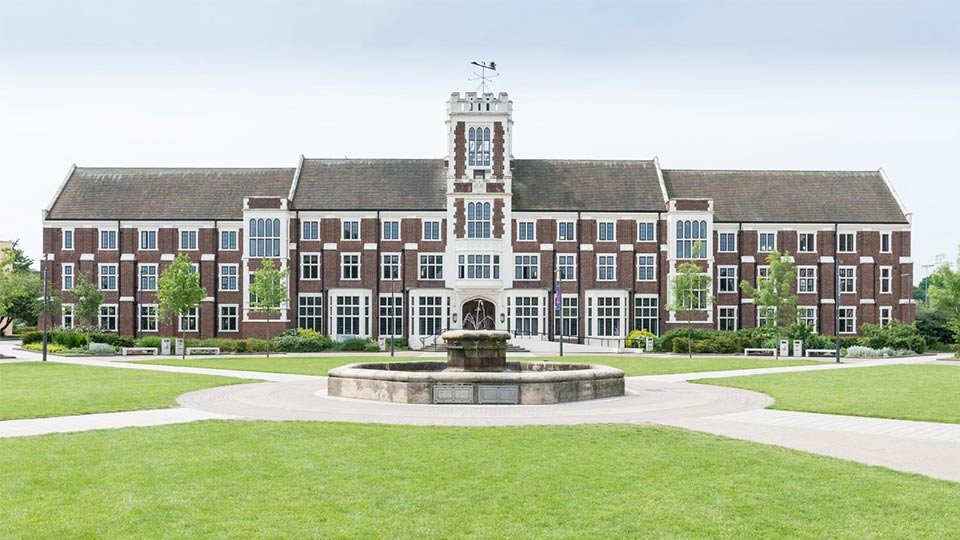From donating personal protective equipment (PPE), to advising healthcare workers on having difficult conversations, the Loughborough family have shown their support for frontline workers in a variety of ways.
Below we highlight some of their efforts…
- Equipment
As well as donating pre-existing equipment, academics have made use of the University’s expertise in 3D printing to provide more essential supplies.
Colleagues from across the Wolfson School of Mechanical, Electrical and Manufacturing Engineering, the School of Design and Creative Arts, and the Research and Enterprise Office have come together to supply Derbyshire Healthcare NHS Foundation Trust with 2,000 face visors.
 David Thompson and Matt Biddulph of Loughborough University with the visors for Derbyshire NHS Trust
David Thompson and Matt Biddulph of Loughborough University with the visors for Derbyshire NHS Trust
Working in partnership with engineers at Toyota Manufacturing UK, staff produced frames for the visors and helped improve the speed and quality of production.
Colleagues within Wolfson also supplied 200 laser-cut visors to Monarch Care Homes, which provide nursing and care for older people.
Dr Paul Roach, Senior Lecturer in Biomaterials and Interface Science within Loughborough’s School of Science, has been using his 3D printer at home to create attachments for face masks to make them more comfortable than elastic around the ears - and his children have been assisting him.
The attachments are now being used in Derby, Burton and Royal Stoke hospitals, as well as local GP surgeries and care homes.

Dr Paul Roach and his children with the 3D printed mask attachments.
Loughborough University London colleagues also worked with Hobs 3D to create masks for healthcare workers after spotting a request (on Twitter) from Camden and Islington NHS Foundation Trust as they urgently needed visors to protect workers in their Mental Health isolation wards.
- Support
Teams and individuals across the University are supporting the national effort to increase testing for the virus and the analysis of swab samples.
Professor Mark Lewis, Dean of the School of Sport, Exercise and Health Sciences, is working closely with the Government to identify resources, equipment and skilled personnel at Loughborough to support the implementation of COVID-19 testing centres across the UK.
This includes the loaning of equipment to organisations such as Randox Biosciences, who are setting up testing facilities to ramp up the country’s fight against the virus.
The School have also provided the National Biosample Centre with protective gear and equipment supplies to support their work in analysing swab samples, to determine whether COVID-19 is present.
Professor Lewis and colleagues from the National Centre for Sport and Exercise Medicine (NCSEM) have also been assisting with keeping NHS clinics open where needed to ensure that important healthcare activities still go ahead.
- Expert advice
Loughborough University experts have also been sharing their expertise to help healthcare workers and ensure safe practice.
In order to support manufacturers in creating ventilators that work as intended and staff can understand and operate effectively and safely, the Chartered Institute of Ergonomics and Human Factors published national guidance on usability and testing of rapidly manufactured ventilators, to which human factors colleagues within the School of Design and Creative Arts contributed.
Professor Sue Hignett is leading a dedicated panel that has been established to directly advise on how best to design the machines.
The panel is also working with the Faculty of Intensive Care Medicine (FCIM) to produce the ventilator usability testing protocol.
 Image courtesy of Getty Images.
Image courtesy of Getty Images.
Also supporting the performance and safety of NHS workers are Patrick Waterson and Thomas Jun from the School of Design and Creative Arts, who are actively advising on data collection/analysis for improving organisational learning at the NHS Nightingale Hospital in London.
Professor Malcolm Cook, Associate Dean of Research (ABCE), has also been involved with the Nightingale Hospital in London, advising the Government through the Chartered Institute of Building Services Engineering (CIBSE) and the Royal Academy of Engineering (RAEng) on the ventilation design of the new facility.
Dr Ruth Parry and a team of academics from the School of Social Sciences and Humanities have also provided guidance to clinicians who are likely to be having – and training people who will have – difficult conversations with patients suffering from COVID-19 or those closest to them.
Their recommendations have been shared with NHS Health Education England and used to develop a series of open access resources that aim to support healthcare staff.
 Image courtesy of Getty Images.
Image courtesy of Getty Images.
- Developing tests
Academics from the chemistry department in the School of Science are involved in early-stage testing focusing on research breath systems, to see if it is possible to detect COVID-19 infection in breath. This work is taking place with partners at Edinburgh Royal Infirmary.
Dr Sourav Ghosh, an expert in Healthcare Engineering in the School of Mechanical, Electrical and Manufacturing Engineering, is also in the initial stages of exploring if COVID-19 can be detected early in the infection phase through saliva samples.
Dr Ghosh and his research team are currently generating data to support their proposed technology and methodology and hope to eventually secure funding to undertake clinical trials.
- Examining strategy
A team of researchers within the School of Sport, Exercise and Health Sciences is coordinating the UK stage of a worldwide survey that will provide us with ongoing information about how people are responding to government messages and strategies, and what impact social distancing is having on the progress of the pandemic.
Dr Nicola Paine, the project lead, says the results will provide evidence to help governments around the world, including the UK, to understand and adapt their strategies where necessary.
- Analysing media coverage
In the Centre for Research in Communication and Culture, Professor Sabina Mihelj and Dr Václav Štětka are investigating how citizens in four European countries are using the media to keep up to date with the evolving COVID-19 pandemic.
The research has the potential to bring in-depth insights into the impact of a public emergency on media freedom and democracy.
 Image courtesy of Getty Images.
Image courtesy of Getty Images.
- Understanding the pandemic’s impact
Loughborough’s Professor Jo Aldridge, Director of Research for Social and Policy Studies, is currently involved in a new international study that will explore the experience of family carers during the COVID-19 pandemic, to understand how they are coping and whether changes in policy, legislation, and health and social care provision are impacting their wellbeing and caring responsibilities.
As part of the ‘Caring through Coronavirus’ project, Professor Aldridge will conduct interviews over the next three months and share the findings from the study every week with key Government departments and charities.
A new coronavirus survey was also launched in April by Dr Gemma Witcomb and a team of researchers in the School of Sport, Exercise and Health Sciences to better understand the impact of the virus on daily life and learn more about health and wellbeing in exceptional circumstances, such as prolonged periods of isolation and changes in exercise routines.
The survey results will be used to identify the groups that are most at risk of prolonged poor wellbeing after the pandemic has passed and highlight what areas of healthcare may require more intervention, development and support going forward so that services can potentially prepare.
And finally, a total of 23 experts from Loughborough University contributed to a Parliamentary survey to understand their concerns about the impacts of the COVID-19 outbreak both now and in the future.
The POST (Parliamentary Office of Science and Technology) has now begun publishing a series of reports outlining the results of their findings and analysis, centred around 15 broad areas of concern.
This article is an adaption of a feature, titled ‘How do you tackle a pandemic? Together’, shared in the University’s online magazine, VOLUME.
The article, which also outlines the efforts of alumni, can be read in its entirety here.

To keep up to date with COVID-19-related press releases, follow the dedicated section in the Media Centre.
